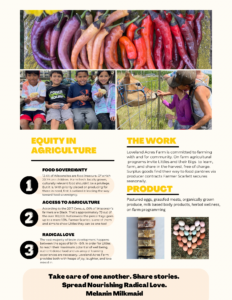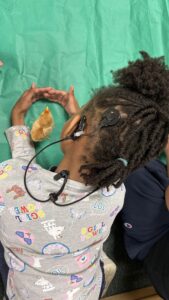Final report for FNC22-1350
Project Information
Loveland Acres Farm is a small scale, value added dairy utilizing diversity in plants, animals, and humans to regenerate the land, nourish souls, and cultivate community on five acres in southern WI.
Around here we believe folks deserve safe spaces where the air is fresh, noise is from nature, and joy can prevail in the moment. We know all people deserve access to locally grown farm fresh food, yet 20.7% of WI’s children are food insecure. Using a variety of sustainable farming practices Loveland is working to bridge the gaps in food sovereignty that exist for marginalized Littles and their families by providing multifaceted agricultural programming that lead to experience with goat kids and cow kisses, growing and gathering.
Marginalized groups historically and continue to be underrepresented in agriculture. According to the 2017 Census, .06% of Wisconsin’s farmers are Black. That’s approximately 73 out of the over 110,000. Nationwide the percentage goes up to a mere 1.3% and is equally as dismal for other groups accounted for. Missing from the data are the all too often overlooked differently abled farmers.
Representation matters.
Sustainable agriculture has been built off of the backs, ideas, and practices of the aforementioned. Yet the opportunities and accessibility for these groups of people today, particularly at blossoming young ages, are extremely limited.
Community Gardening with Chickens & Littles will work at bridging the gap to agricultural access for marginalized littles and youth by providing exposure and hands on learning opportunities focused on: growing culturally relevant crops, while using chickens hatched by families to improve and maintain soil health, and learning the importance of pollinators for it all to come together, as we are as farmers of the rainbow.
This work will lead to affordable, accessible Nourishing Radical Love mutual aid shares containing: pastured eggs, organic vegetables, and in the long term, honey.
- Provide a safe, accessible garden space for children of all abilities and backgrounds
- Provide hands on learning activities based in garden space
- Teach the importance of pollinators
- Utilize chickens & chicken tractors for weed/pest management
- Guide discovery of diversified systems and how they help the whole thrive
- Provide mutual aid shares containing: organic veggies, pastured eggs, and honey
- Begin to instill the value Ag is for ALL
Research

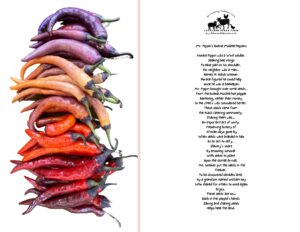
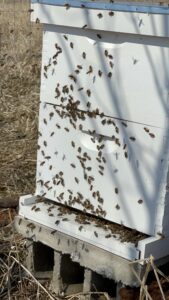
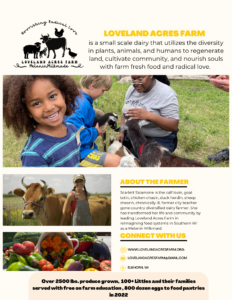
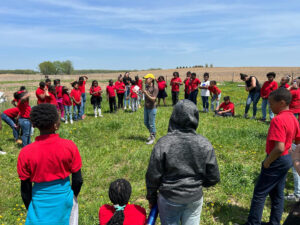
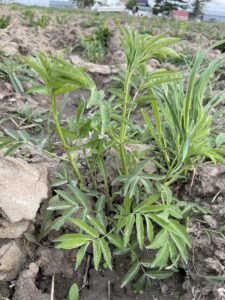
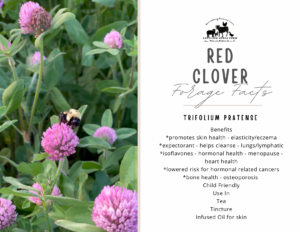
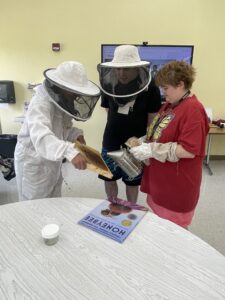
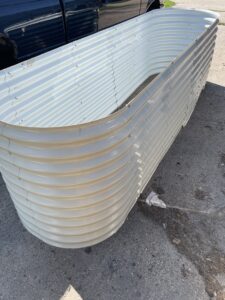
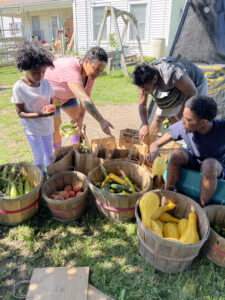
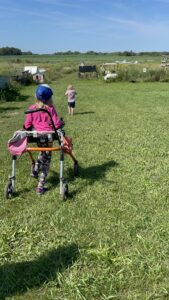
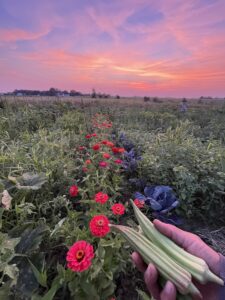
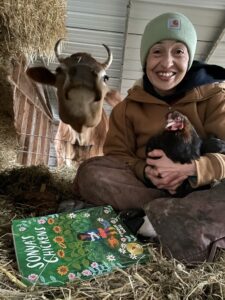
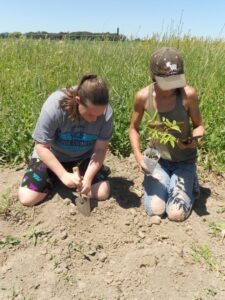
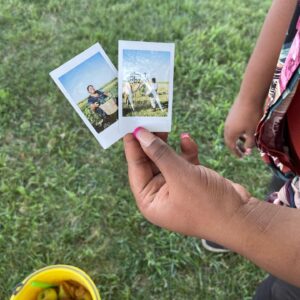
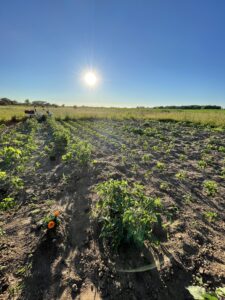
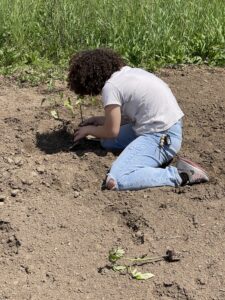
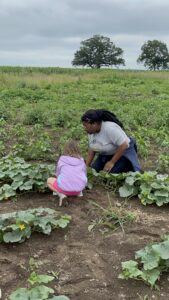
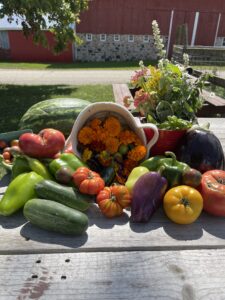
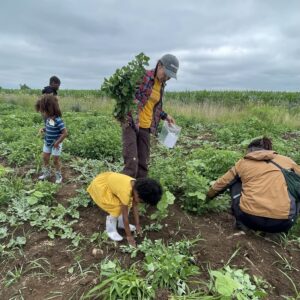
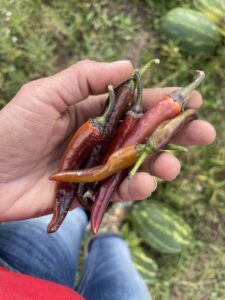
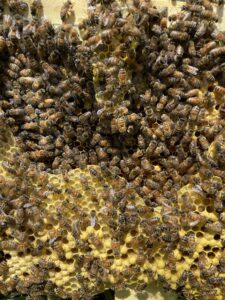
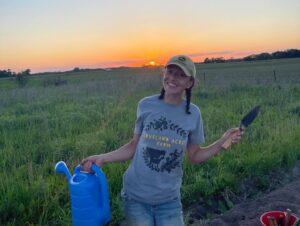
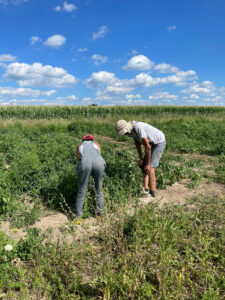
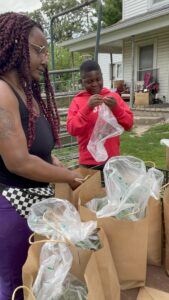
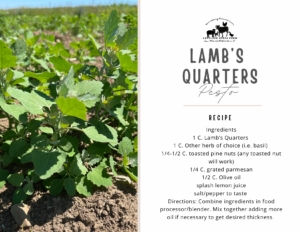
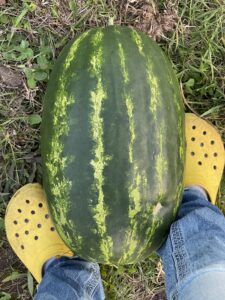
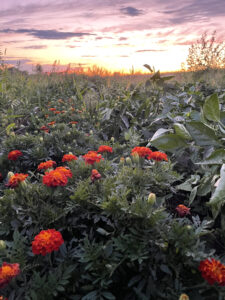
Community Gardening with Chickens and Littles is a project created to help address the historical and continual under representation of marginalized groups in agriculture. Did you know of Wisconsin's 110,000 farmers only 73 are Black? That’s around .06% according to the USDA 2017 Census. Sustainable agriculture has been built off of the backs, ideas, and practices of the aforementioned. Yet the opportunities and accessibility for these groups of people today, particularly at blossoming young ages, are extremely limited.
Loveland Acres began addressing accessibility in agriculture for underserved Littles and their families several years ago with farm visits and it’s home/school hatch program, Chickens & Littles. This program brings families to the farm to get a lesson on incubating chicks, all the equipment and eggs needed to hatch at home, and farmer support throughout the three weeks to successfully incubate. Upon hatch, families bring chicks back to the farm, help set them up in brooders, and anxiously await updates as their chicks grow.
In order to meet the desires of those wanting more knowledge of farming the idea to add a community grow space came to fruition. Not only would this garden help food sovereignty in our area but the chickens hatched by Littles and their families could be used sustainably as pest management and soil improvement during the off season.
With the help of neighboring produce farmers, Johnson’s Vegetables, a 1/8 acre plot was cleared in the Fall of 2021. A group of young adults were selected to participate in a learning cohort for the coming season together with Farmer Scarlett. Priority was given to BIPOC and LBGTQ individuals to participate in the cohort. Ages ranged from 18-22.
During January and February of 2022 the cohort began holding weekly virtual meetings to: begin the first of several book studies, set learning goals, and select seeds/crop varieties for the upcoming season. We began with the book Farming While Black, by Leah Penniman.
In March the order was placed for beehives, equipment, and Italian bees from Dadant beekeeping. Community was invited on farm to help kickoff the project with a gathering of intention. This gathering was a time to share what the program was about, get folks signed up for participating, see the planting space, and to start seeds for the season. Each family went home with seed starts and some beginning knowledge on container gardening. All garden gatherings are free to participants. The barriers for marginalized folks to get to a farm are steep enough. The intention of this project is to put people over profit. However, upon request, the farm did add a donation option for folks wanting to contribute solidarity funds.
April brought about the welcoming of our bees, the start of Chickens & Littles hatching, & more seed starting. With it being our first season keeping bees and having limited gear, video was taken to share our bees’ arrival with community via our social media platforms. Our community was amazed to see them finally here! This generated even more excitement to grow together!! Beekeeping would continue to be shared virtually throughout the season.
May should’ve brought flowers but instead we began receiving harassment from a racist just as the farm was ready to start weekly community gatherings. Outreach was put on hold so the well being and safety of community could be assessed. Despite the delay in being able to come together, farmlife continued. First hive inspections were started, as well as more seeds, and privately scheduled visits were welcomed.
June brought the arrival of our Loveland Super Hero, Farmer Johnson, to prep our plot for planting and bring hundreds of plant starts. Despite our best efforts, not having some type of greenhouse made it incredibly hard to get enough seeds started and going, as did the chickens finding what was started. By sharing their surplus starts, Johnson’s Vegetables ensured we’d have a solid and full garden so long as the starts got in the ground. All starts were planted and watered by various hands. This month also brought the arrival of a new community connection with VIP Services, a local nonprofit serving adults with disabilities. Throughout the month, and duration of season, they arrived weekly to help in the garden. Due to ongoing harassment the farm continued to meet with other community through privately scheduled planting parties.
By July, the plants were all established. There were: open pollinated cucumbers, pickling cucumbers, a variety of rainbow bell peppers, Bueno Mulata peppers, Fish Peppers, Jalapeños, poblano peppers, banana peppers, watermelons - the old fashioned seeded kind our people grew, zinnias, marigolds, lambs quarters, yarrow, basil, heirloom tomatoes, eggplant, ground cherries, elderberry, dill, & lemon balm. Weekly gardening programming began. These gatherings included: a storytime, plant and/or pollinator lesson, hands on time in garden to weed and/or harvest, a garden snack, and bags to pack produce for themselves and others in their community.
August and September were bustling! Despite endless harassment Community Gardening with Chickens and Littles was in full gear. Weekly gatherings had come to be anticipated by regular families and continued to welcome new faces. Produce was pouring in by the bushels. Like loaves and fish type of stuff, okay? It was mind blowing how much food the plot was producing and being sent to folks in need. Our friends at Johnson’s Vegetables sweetened the harvest by sharing excess veggies of theirs that complimented what was being produced here for folks to have access to. As part of the project, all families involved in weekly programs were able to take home produce for free. The farm also partnered with the nonprofit organization, F.A.R.M.S., to be supported in taking excess produce to two rural food pantries. Our young farmer cohort took produce for themselves and their families as well as dropped off excess to free fridges in Milwaukee and to other farmily members not able to make the drive.
The garden space continued to be managed entirely by hand. By using minimal tools or equipment to manage the garden the farm is able to model growing in a way participants could recreate in a smaller home garden space with seeds and starts they take home.
By October though most of our plants had slowed and/or finished for the season, the desire to farm on was heard from community. Weekly gatherings continued as weather permitted and last harvests were savored by all. The project team (Farmer Scarlett and cohort - the Love Crew) had become well adept over the last few months teaching in the garden. With this confidence they welcomed the farm’s first public school field trip. A group of wide eyed, curious 2nd graders from Milwaukee College Prep arrived ready to learn about the legacy we have as Black farmers and importance of food sovereignty through community farming efforts. By utilizing stations the students were able to: meet dairy animals, see chickens managing pathway overgrowth in a chicken tractor built for this project, meet and hold some of the latest chicks hatched, learn about beekeeping and it’s tools while trying on a suit, and eat their sack lunches in the fields with a slice of farm fresh watermelon (or two) for dessert.
In November all the plants were cleared and ground prepped for winter. With such great success the first season the decision was made, under guidance of the farm’s mentors Farmer Johnson 1 and 2 (dad/son), to expand for next season. The space was doubled in size to now be at 1/4 acre. The bees were bundled up for winter with blessings spoken over them to make it to spring. In order to come back together one more time the farm hosted it’s 2nd Annual Farmsgiving meal. Loveland Acres Farm, Johnson’s Vegetables, and other local farmers contributed to a fantastic farm to table meal on site. Photos from the season were printed and set out for guests to reminisce and new farm friends to see what the project was all about. During this meal, one of the guests in attendance also happened to be the person that just took over the Fondy Farmer Market. Before they left it was shared we had officially met the requirements of a farm visit and if the farm was interested it would be welcome next season to participate at market. Of course the answer was a resounding yes! Community Gardening with Chickens & Littles is doing exactly what it set out to do: provide access to agriculture and farm fresh food at free to little cost to marginalized families and individuals.
December and January will bring working on the additional chicken tractors to be ready for spring of 2023. Seeds will be selected for the upcoming season taking in to consideration the varieties project participants shared they’d like to grow. Having community involvement in all aspects of this project is integral to working toward food sovereignty. One must be allowed to take part in their food system if food sovereignty is to be achieved. A new cohort will be selected to join the project in 2023. This group will go through the same book studies and mentoring the current group has. The current cohort has expressed deep desire to continue farming and will return next year to do so. With their acquired skills they will be able to help the farm welcome more folks as they take on leadership to guide others on their own. They will also continue delivering to free fridges, other Milwaukee community, and be the farm’s market ambassadors.
The beginning of January and almost year two of the project brought a lovely invitation to the farm’s email. The farm was invited to participate in the 2023 PBS Gardening and Landscape Expo, February in Madison. Of course the answer was yes and we are now looking forward to: running a kid’s activity table, presenting a seminar on food sovereignty using this project as a model, and participating in the Farmer’s Market.
Year Two at a Glance
January if 2023 brought much excitement to enter a new season. The farm kicked things off by having a seed fundraiser using sunflower seeds saved from our partner farm’s patch and harvested/packaged on farm at Loveland. The temps were a but unseasonal for portions of the month which allowed me to delight in seeing our bees were still alive and doing well.
February the farm loaded up all things Community Gardening with Chickens & Littles, headed to Madison, and attended the PBS Garden Expo. While there information about our garden project was shared, as were seeds, and cards with garden poems/pictures of the Buena Mulata pepper. One of importance to the Black diaspora. To celebrate Black history month I did a series of video storytimes from the barn with a beloved farm chicken and our cow, Clementine. The videos featured many poems about Fannie Lou Hamer, a champion for justice of all types. We managed to get another chicken tractor knocked out and set to roll. Bees were still alive and well, I could hear their hum through the hive. Incredible, really.
In March the farm rolled out our various share options for the season. The farm’s share signups once again increased. During prime season 50 various shares were going out. This was a comfortable number. Going forward it will be a goal to reach to help sustain the project.
In April, I applied for a grant. I didn’t receive it but am actually really happy that it led to me creating a pitch card for what the garden project and farm has been able to accomplish. Chickens & Littles kicked off this month and our resident racist arrived back in town after a short winter nap. Once again, myself and the project were forced to pivot with how to proceed due to no fault/control of our own.
By May Chickens & Littles was bustling thanks to addition of Purina becoming a sponsor to the program. By providing feed, swag, and more it increased the farm’s ability to reach more Littles. Our first field trip of the season arrived and our most committed young farmer began coming to the farm, faithfully, each week with her Little brother. She is a senior in high school, he is a kinder kid. While our bees looked good in March, a rodent had moved in and killed them by April. Thanks to our friend and partner farm Johnson’s Vegetables we were able to get some and start again. This is also the month our weekly garden days began though once again the way we shared open days was discreet.
With June came the arrival of Johnson’s Vegetables to prep the garden space for planting and to bring us starts, including our beloved watermelons. Of which we grew three varieties this season! We also received two round of starts from new farm partners CE Farms. The second of which was a full box truck load of their last greenhouse starts. All super healthy and strong, going on to produce much. It was all about the planting this month! The Ellenbecker group brought some guests to hear a presentation on grassroots farming as well as foraging and an abundance of communal education was taking place. Lots of native plants went in for the bees and all other species. Blueberries and strawberries obtained and planted beginning the second section of our no till space. This area will become a combination of strawberries, blueberries, yarrow, echinacea, and more going forward.
By July the harvests began rolling in and everyone with hands in began taking some out. Along with the farm’s paid shares, 50 bags per week began going out to those in need, our young farmers took what they desired, and our Little farmers did too! We got our Vego Garden beds set up for the VIPs gardening ease. Education focused on beekeeping, native plants and pollinators - of which their were twice as many thanks to our cover crop and native flower/flower efforts, why we use chicken tractors and the benefits and more. This is also the month we began sending bushels of produce to Tricklebee cafe in Milwaukee, a pay what you can eatery.
In August the farm was putting out 100 Love Sacks per week to those in need, plus sending bushels to other organizations, as well as fulfilling shares. When I say loaves and fishes... just wow. This month the farm repurposed a trailer given to us into a produce stand. It wasn’t used this year but will certainly be a joy for next. A highlight was to head back to Madison for a BIPOC local food entrepreneurs showcase where we were able to make connections with other producers.
September the garden was still going strong as were the farm’s hatches and tractor rotations. Watermelons, cantaloupe, and peppers of all types were gloriously abundant. This year the farm produced well over a hundred various melons! With many of our young farmers, of all sizes, heading back to school, the on farm days slowed. Pickups were still arranged and the farm was back down to around 50 nicely filled sacks being sent out.
October amazingly still had quite the harvest hauls. Peppers, particularly hot, tomatoes, flowers, herbs, cabbage, and more still gave joy. Meat peeps were being brooded to trade chicken tractor spots with our garden girls so they could be trained to their winter housing.
November we celebrated harvest with an on farm bucthering class and our beloved Farmsgiving meal, not on the same day of course. What joy to be the farmer to provide this sacred space.
By December typically I am beyond done but these days call for an extra closeness of community. Therefore we decided to host a couple Cookies, Cocoa, and Calves days featuring a wreath project incorporating dried flowers, peppers, and other foraged bits from the farm to hold close until spring.
This program went beyond my hopes and expectations, in all the ways, good and bad. There is a vast amount of goodness that occurred. Too much for this report. But know this, this farm may be little, our impact is strong.
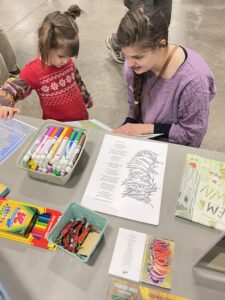 Through the NCR-SARE funded project, Community Gardening with Chickens and Littles, a 1/8 acre garden plot was started in spring of 2022 in order to provide agricultural access to underserved littles and youth through hands on learning opportunities focused around: growing culturally relevant crops, learning about the importance of pollinators, while using chickens from our home hatch program, and to manage pests and improve soil health during the off season.
Through the NCR-SARE funded project, Community Gardening with Chickens and Littles, a 1/8 acre garden plot was started in spring of 2022 in order to provide agricultural access to underserved littles and youth through hands on learning opportunities focused around: growing culturally relevant crops, learning about the importance of pollinators, while using chickens from our home hatch program, and to manage pests and improve soil health during the off season.
Within it’s first season the project served over one hundred littles and their families, welcomed disabled adults weekly from VIP Services, a local nonprofit, mentored a cohort of young adults twice weekly, hosted weekly farm gatherings for community to teach about sustainable growing methods, produced over 2000 pounds of culturally relevant produce that was paid forward through mutual aid, grew and gave away over 100 watermelons, partnered with Johnson’s Vegetables to receive surplus veggies to compliment on farm food, partnered with F.A.R.M.S. to deliver pastured eggs and fresh produce to two rural food banks, delivered food to Milwaukee free fridges via young farmer cohort members, hosted a Milwaukee public school for a Fall field trip, celebrated the end of the season with a Farmsgiving feast incorporating food grown on farm during the season, and received an invitation to participate in the Fondy Farmer’s Market for the 2023 season.
The energy Community Gardening with Chickens and Littles received from participants and local community combined with loaves and fish type harvest, the decision was made to double the space. With help of our project partners, Johnson’s Vegetables, the garden space was expanded to 1/4 acre for the 2023 growing season.
The curriculum created for the first year’s programming will be utilized in all subsequent years following with tweaks being made as needed to teach about growing season. Littles and community returning will be encouraged to shine as they share knowledge gained from previous year. Long term connections to agriculture is the goal!
Within this project, Littles and their families learn: sustainable practices for growing food by encouraging biodiversity, how to grow at home in a variety of ways to meet all size spaces, the importance of pollinators, a love of the land and for animals, how to care for themselves and others, and most importantly, that Agriculture is for ALL.
Going in to the second year of the project the farm is definitely going to be looking at adding more sustainable methods of watering the space. This has been a topic during farmer mentoring sessions. Further consultations will take place to increase the efficiency of operations, keeping sustainable methods at the forefront of all solutions.
While a quadrant sampling workshop didn’t happen the first season, photo documentation was taken of species visiting the garden. It was phenomenal to watch the increase of garden friends and, admittedly, pests arrive. A pictorial testimony to sustainable methods is in the works and we will continue to update this in 2023.
Making kid friendly recipes incorporating what was being harvested from the garden was a favorite family activity. It provided another component in working toward food sovereignty and got Littles excited to cook for themselves and their families.
From managing a fairly large space by hand to dealing with racially motivated harassment, coordinating getting folks here to getting food out - the season was busy- in the best type of way. The farm was able to serve and teach over a hundred Littles in it’s first season of Community Gardening with Chickens and Littles. The garden space produced thousands of pounds of food, not including watermelons. Efforts to keep up with weighing were futile without proper scales to do so, but numbers gathered were high. Like loaves and fish. All of what was grown here was matched in amount with complimentary produce from our partner farm, Johnson’s Vegetables. The farm was able to pick up a contract to serve rural food pantries and offered Love Shares - our version of a CSA. Through love and solidarity folks from near and far supported the project. Seed to Fork of MN led the way by donating their garden tour funds to the farm which will be used to purchase children's bee suits. Others followed sending items to help package produce with dignity, Little friendly knives to have for cooking day, and donations to pay produce forward. All the hard work put in this season was seen and acknowledged with our invite to Fondy Farmer’s Market in Milwaukee. Something that means so much as a Black farmer as that’s where I came here from.
It’s important to give back. Even more so to do it in meaningful ways that help regenerate land, nourish souls, and cultivate community. That’s exactly what Community Gardening with Chickens & Littles is doing.
During the off season much of the time spent will unfortunately be spent pursuing legal action against the individual threatening the safety and integrity of this project.
In picking up where this last left off, it’s important to give back. Using what you have, where you are, how you can. Which is precisely what this project outdid itself doing. With the doubling of the space for the 2023 season, we were able to produce over 2300 pounds of watermelon alone. The garden was jam packed with over two thousand plants and fed and educated hundreds throughout the season. While we did add a few drip hoses the majority of the garden was tended by the hands of many. You really can change the world if you care enough and that’s just what we intend to keep on doing with and for our community.
We are still pursuing legal action but finally obtained a restraining order for the moment after literal shots fired.
Educational & Outreach Activities
Participation Summary:
Consultations were with Aaron, David, and Peggy Johnson of Johnson’s Vegetables. These took place on their farm, in the fields, as we prepped for their market in West Allis. We also had community garden site visits where the health of the garden was assessed together.
*
Recipe and herbal cards were created to go along with each Community Gardening with Chickens and Littles field day. Every Little (and Big if they wanted or were there on their own) was able to take home a card. Some of the recipes were made together on farm, others prepared in advance for tasting. The posters were created for the 2nd grade field trip the farm hosted.
*
Demonstrations were based around beekeeping: equipment, safety, importance
*
Online Trainings were with Young Farmer Cohort and were held pre-planting season. These trainings helped us create a sense of unity heading into the season, expectations, educated on Black farmer legacy and food sovereignty, and time to set individual learning targets for themselves.
*
Farm tours were done with individuals and/or groups unable to participate in other gatherings/field days. The tours involved time with animals, a visit to the garden paired with a short lesson on bees, and produce to take home if available at time of tour. One of our highlighted visits was from farm friend, State Rep Francesca Hong. It was wonderful having her visit the farm again this year while being able to share the garden project. While she relished in some sanctuary time, I was able to put together boxes of produce and apples from our tree for her to take to the Sikh temple in Oak Creek on the anniversary of the shooting there. I was humbled to provide.
*
On 12/12 I gave an informal presentation on Community Gardening with Chickens & Littles to the Deputy Director of Walworth County Health and Human Services along with two representatives of the Walworth County DAC. I shared accomplishments, approximate numbers of food produced, approximate numbers of Littles and families served, struggles, goals for garden and other programming going forward. This presentation came after attending a WalCoDAC meeting I was invited to by County Board member, Brian Holt. Outcomes from this meeting resulted in an anticipated partnership for the 2023 season and beyond. Littles, their families, and other young people in recovery will be referred to the farm for services through ag. programming we provide. Another meeting will be held to discuss: their asks of the farm, referral process, start dates (asap desired on their behalf), farm needs to expand offerings, price scale from farm for participation in various programming.
*
Our field days were shared as Community Gardening with Chickens and Littles days with community via social media/word of mouth. While I had hoped we could be more boisterous in our sharing of this project, ongoing harassment kept me from feeling comfortable in doing so. However quiet and short noticed the day was, we had families show up. These days involved a story time relating to the project, time in the garden and fields, and some other type of hands on activity (craft, cooking, seed saving, etc). Once the garden began producing we had lessons on food sovereignty and caring for others while we picked and packed produce to go home. Each Little was able to pack a Love Sack (produce bag) for themselves as well as extra bags for people in their neighborhood. Johnson’s Vegetables often contributed surplus to our abundance allowing the farm to send home bushels of veggies to be distributed. A number of families were also sent home with pickling kits and received coaching to quick pickle cucumbers at home. We used word of mouth and social media graphic posts to share field days.
*
Chickens & Littles is the farm’s home hatch program that was in existence prior to this project beginning. This program provides families with all they need to hatch chicks at home and support throughout incubation. Upon hatch families spend a short time with chicks before returning them to the farm. They are welcomed back as Master Hatchers and encouraged to come back to visit and help care for their chicks as they grow.
*
Love Crew is what we decided, as a collective group, to call the aspiring young farmer cohort. During our learning sessions I spent time teaching them what we as a team would be teaching littles on field days, discussing our readings while working in the garden, learning how to properly care for plants, discussing food sovereignty and our legacy as Black farmers.
*
VIP Services is a local nonprofit serving disabled adults. They were referred to us for a potential outreach connection and of course the answer was yes! Each week for 8 weeks we met for VIP farm days. These involved animal visits, gardening lessons, time in the garden, time with chicks, and packing eggs & produce for them and others. We celebrated the end of the season together by attending the county fair with them.
*
The farm hosted it’s first field trip for 71 2nd graders from Milwaukee College Prep. This field trip focused around our legacy as Black farmers, food sovereignty, and how community gardening/farming is central to it all. This trip involved stations on diversified dairy, calf care, food sovereignty/Black farmer legacy, chickens & littles where they learned about hatching and got to hold chicks, and ended with a picnic in the field with the last bit of farm fresh watermelon.
*
Farmsgiving is a community meal hosted by the farm to celebrate the harvest and season together. This was the second year the farm held this meal and thanks to Community Gardening with Chickens and Littles our attendance grew by leaps and bounds. We were also able to share more about the program with local community members that attended.
*
Community Gardening with Chickens and Littles welcomed and served over 100 Littles during the 2022 season!! This number is not including the adults that attended with them. I’d estimate the total number of adults on farm throughout the season to be somewhere between 50-75.
*
The farm is currently seeking legal counsel in regard to harassment. It is my hope this matter can be eliminated before the bustle of the 2023 season hits. The way we share events, field days, seek press, etc. is extremely hindered because of safety concerns. Our current families are anxiously awaiting spring and our partnership with Walworth County should help keep the program thriving and growing regardless of how we can promote going forward.
Learning Outcomes
What did you/others learn from this grant?
- The most glaring lesson learned, right out the gate, with this project was racism is still going strong in Wisconsin. This proves projects like ours, that uplift marginalized folks, are a high priority need. Safe agricultural spaces for Black, brown, disabled, and other marginalized groups are few and far between, even more so, rurally. Becoming a well known spot, from Madison to Milwaukee and everywhere in between, for folks to receive nourishing radical love in all forms has been a highlight of this project.
- Vast knowledge was gained in: growing from seed without greenhouses or lights, pushing garden limits to the max with creative companion planting, and working toward a no-till food forest type plot that is diverse in plants, critters, and humans tending it. Myself, our young farmer cohort, and many guests all gained growing power. Whether working in the community garden here or tending their own little plots or pots at home from seeds/starts they received from our project. We proved anyone can grow their own food, where they are, when taught how, and given the means. The best days were when this farmer would receive messages filled with pictures of a guest’s lil’ garden growing at home. The farm even helped a Chicago firehouse get growing! In turn inspiring efforts going forward to help more firehouses/police stations/etc. get growing. Testimonials:
- From a little farmer via his mom: "Put down that he loves the project he wants to move to the farm with you & become a full time chicken farmer & carries around a Polaroid picture of you both! LOL Because it’s true!” - Lil’ Farmer M’s mom
- From a cohort member: “Raising chickens and teaching Littles is the best part of the farm! Raising chickens is like having real kids....they are incredible!! And a lot of work. The best part about teaching the Littles about farm life is seeing their beautiful faces light up when they’re interacting and asking lots of questions!” - Young Farmer A
- A pride in carrying on the legacy of Black and brown farmers was grown by all of those backgrounds. A deepened appreciation and understanding, gained, by those not. In year two the garden was bustling with culturally relevant crops representing the rainbow of people coming to visit, receiving food. Okra, watermelons, korean basil, buena mulata hot peppers, thai chilis, and more.
- With aforementioned pride shared, the farm is delighted one of our young farmer cohort members learned they want to do nothing but farm! She has been accepted to UW-River Falls and will be pursuing ag!
- We learned chickens can successfully eliminate the need for mowing with machinery when run in tractors and moved daily. This process combined with the farm’s hatching program gave Littles plenty of opportunities to learn: animal husbandry, regenerative ag methods, what poop is good for and when to use it, and a love for caring for something beyond themselves.
- But I think the most important lesson is what has been our farm’s motto for some time, a quote by Marian Wright Edelman, “You really can change the world if you care enough.” A big part of this project was to put people over profit without a nonprofit since they historically, and continually, perpetuate harm toward those they’re supposedly uplifting. This portion of the project shined bright like the north star leading folks to love one another. In year two we had over 3000 strong, healthy starts donated to the farm from two other farms. One from year one and another gained in year two. 2000+ made it into the community garden and raised beds here, the rest went out to community. By the second year of the program the farm was able to evoke (20) people per week to support Love Sacks (groceries from the garden for those in need) ensuring the farm could roll out as many bags as possible with dignity. Many weeks the farm’s supporters surpassed that number. It may not seem like much but those folks generated over $200 toward the project every week for covering the cost of the food,supplies, gas cards, etc. At the peak of the season the farm was sending out 100 bags of love per week plus bushels for other organizations serving those in need. Culminating to the farm’s increased profitability. Many have taken to our farm for their produce (we are now known for the best watermelons in the area!), CSA (Love Shares), and other farm product needs (eggs, meat, soap, lotion, herbal supports) in order to support the mission and be fed with food raised right. The farm is pleased to have many market invitations to choose from going forward. But you’ll likely catch us at the Jackson Park market come spring. While we could’ve participated in it this year, along with the Fondy market, we chose to keep the integrity of the project to serve marginalized folks first, with increased on farm sales second. With next year’s projections, another lesson gleaned, the farm will be able to support 100 bags to those in need as well as head to market with surplus and our other farm products.
How has this effected the farm? How to put into words the magic that has become Loveland? To know there are at least a hundred folks that call this farm home, means the most. Because really that is what this project is about: helping others thrive in their farming birthright. This project helped us become a known force as producers for the people. So much so we were awarded a WI-LFPA award for 2023 and again for 2024.
Were the barriers overcome? The initial barriers of connecting marginalized Littles and their families was most definitely overcome. Despite endless harassment, police reports, being watched/stalked, and ultimately being shot at, while working alone in the garden, during one stretch of the season in year two, this project persisted to successfully reach & touch hundreds of marginalized Littles, Bigs, and everyone in between. And while the farm still has a few things to clean up due to said racially motivated harassment I’m pleased to say this project will live on for many, many years to come. Transportation is the one barrier that continues to exist. Bridging the rural/urban gap is challenging. A challenge we will continue to take on with love and vigor.
Advantages/Disadvantages to the project: The biggest advantage has been creating a multigenerational, multicultural community with like minded ideas on caring for ourselves and others through farming together. Not only do many hands make light work, but the future depends on knowledge being passed down, particularly to those that have historically, and continually, been kept from it. Every individual has something to offer. Every individual has a right to the land. Other advantages were building partnerships with other farms and organizations as well as an abundance of opportunities from markets to BIPOC local food entrepreneurs showcases and more.
The only disadvantage to this project was by putting the farm out there as one that stands for food sovereignty we dealt with a relentless racist. Speaking the truth is never easy but one must do it anyway. And in doing so, I must once again reiterate, the presence of this ugliness proves the need for projects such as this.
What would I tell other farmers? Farm with love. Every farm has corner space with capacity to produce some loaves and fishes typa ish, as we say around here now, with and for their community if only they cared enough to change the worldly systems that bind us. If one can’t feed one hundred, feed one.
